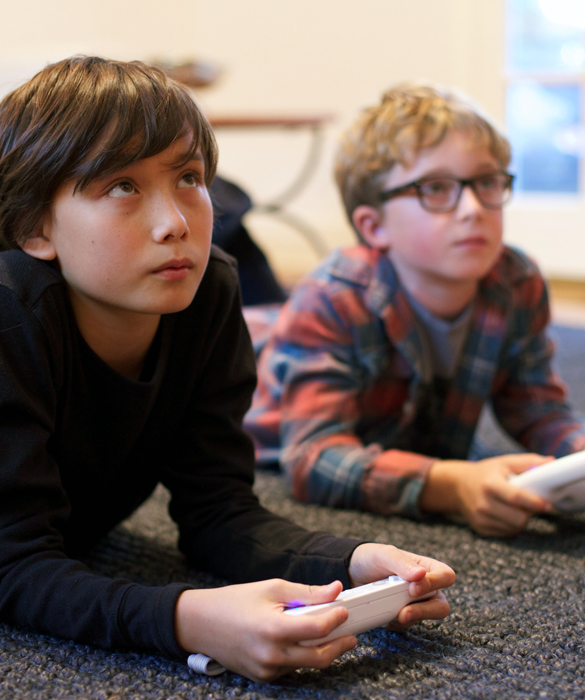On Your Game

Just as parents of older kids need to be in the know before their teens join online communities and social-networking sites like Facebook, parents of school-age kids should also be informed about videogames. There are several issues we want to consider when we think about how much time our kids spend holding a joystick or remote in front of a computer or TV screen.
Violence and Aggression

While it would be an overstatement to say that video games are the primary cause of violent or antisocial behavior, studies show that violent games can be, at the very least, a contributor to the problem. Just as watching violent movies can lead to more aggressive behaviors in kids, exposure to violence in video games can contribute to aggressive behavioral issues.
Childhood Obesity

This issue isn’t a media construction. Kids really do need more exercise, and less time sitting and being couch potatoes. Yes, more and more games require kids to move around and be active, but for the most part, when kids play computer and video games, they remain sedentary. When sitting repeatedly replaces more traditional forms of exercise, kids are at a greater risk for obesity.
The Addictive Allure

For many kids, games beget games. When they play regularly, they want more and more, and they have a harder and harder time accepting “No” when parents tell them to turn off the games. As in so many areas with our kids, it’s important that they get practice dealing with limits and boundaries.
RELATED: Teaching Kids About Boundaries
Motor Coordination

Here’s one of the definite pros of video games. Hand-eye coordination and visual motor skills can improve when children play video games. A recent study from Australia's Deakin University showed that children who spent more time playing interactive electronic games were actually more competent in “object control skills”—like kicking, catching, etc.—than those who don’t play the games.
Educational Benefits

Another benefit is that many video games actually teach kids. Math facts, reading, geography and all kinds of other skills can be enhanced by the right kind of game experience.
RELATED: Are Video Games the Evil Empire?
Safety and Privacy

Identity theft, cyber-bullying and all kinds of other dangers lurk any time we go online. For kids who aren’t able to protect themselves or who don’t have an adult supervising their game playing, these dangers are much more significant. Realize that any time your children are on the Internet, they can send and receive information that can lead to real and significant dangers.
Variety of Activities

The American Academy of Pediatrics recommends that parents limit screen time to an hour or two each day. And that’s the key: limiting. As I’ve already said, it’s not that screen time is inherently bad. In fact, I tell my kids that I like that they play video games in small doses—especially ones that exercise their brains by asking them to think and learn and solve problems. But I also want to make sure that their brains are being exercised in other ways as well—by playing outside, being creative, reading, participating in team sports and other group activities, taking part in community service and even by figuring out what to do when they are bored.
Age-Appropriateness

This is perhaps the most important question to consider when it comes to which games and how long you let your kids play. In my home, my 12-year-old gets to play games that my 6-year-old simply doesn’t. It’s important that we do our research and make decisions about what we’re ready for our kids to know about—and what we’re not.
In the end, parents have to decide for themselves how to handle video games with their kids. One resource I highly recommend is the website CommonSenseMedia.org. There you can look up games (as well as movies and books) by title and read about each game’s specifics. You also can receive guidance to help you make decisions you feel good about.
VIDEO: Kid Rated. Mom Approved.




